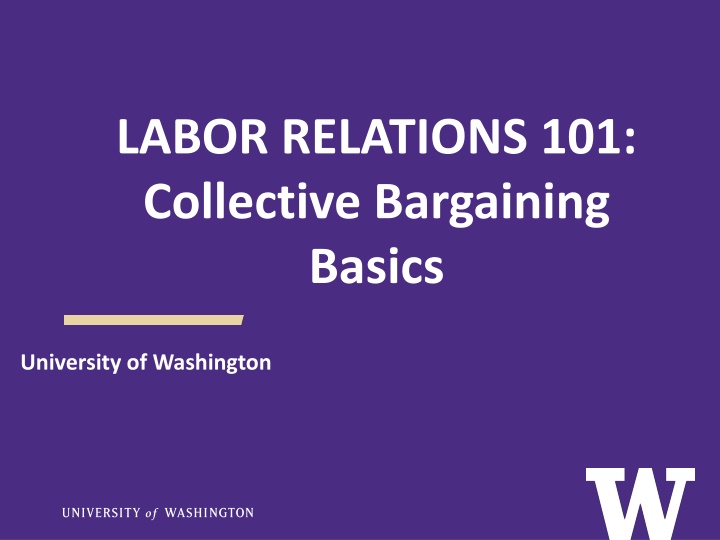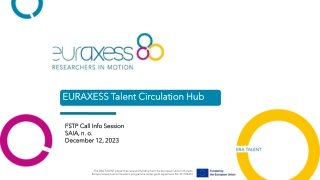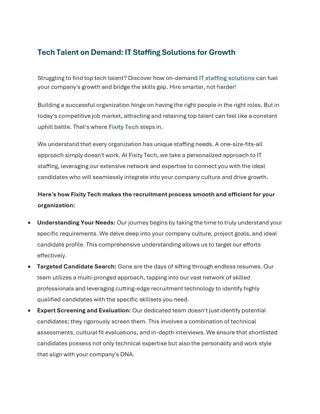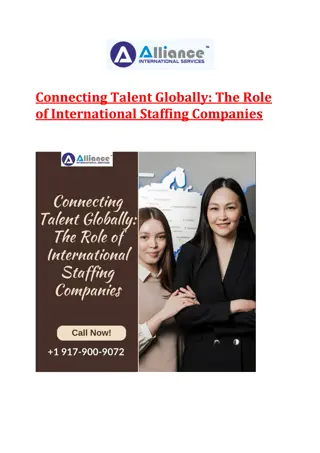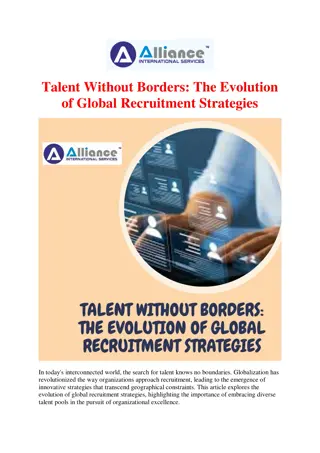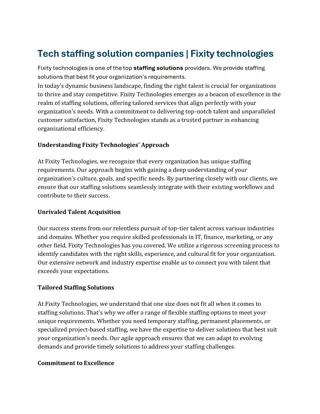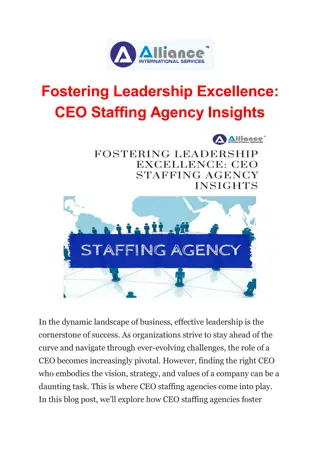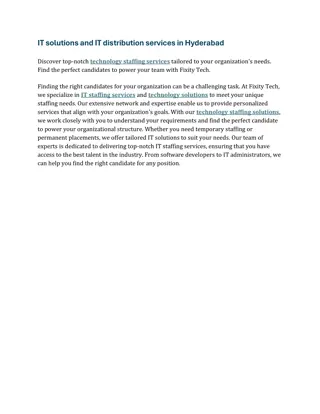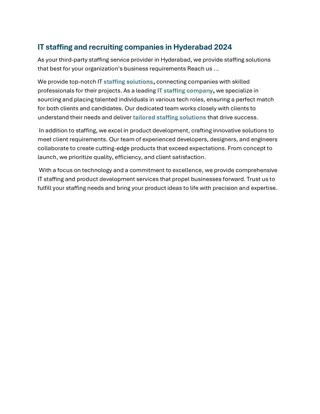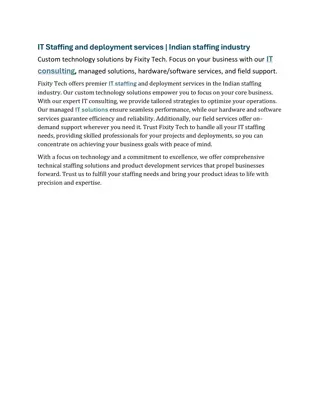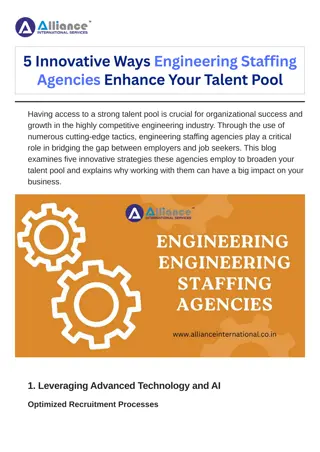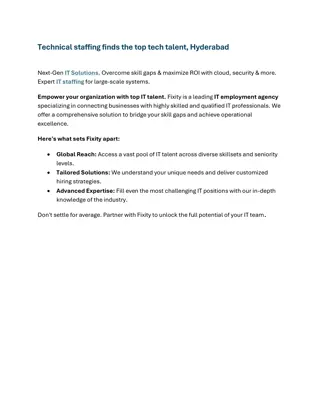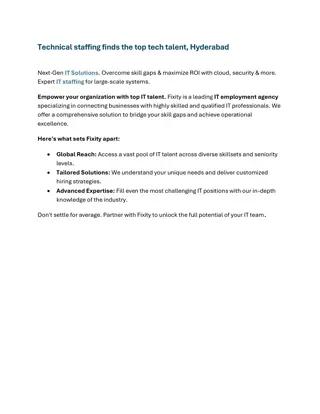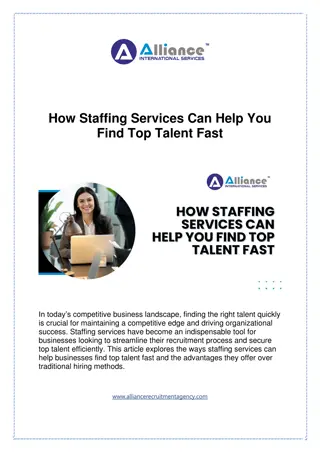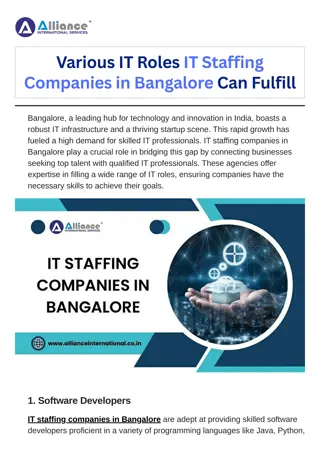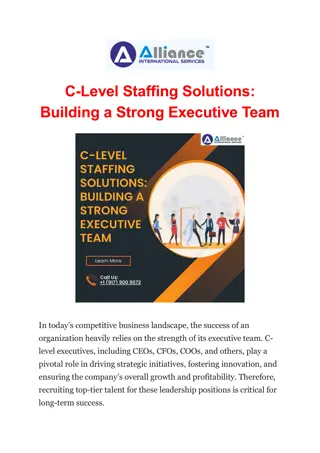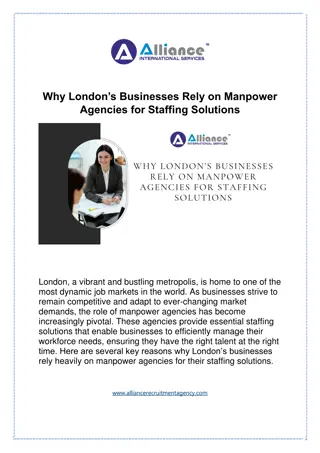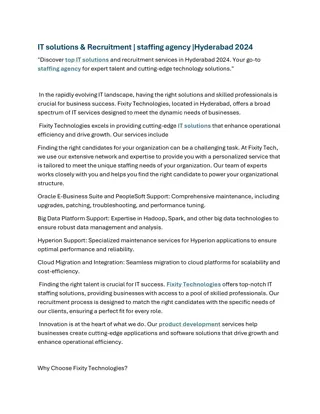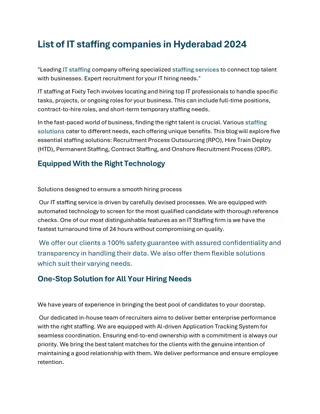VOLT Talent Solutions and Staffing Services Overview
Providing global staffing solutions, managed service programs, and product lifecycle services, VOLT Talent Solutions is an industry leader in innovation. With a strong focus on improving product quality and reducing production costs, they serve over 120 MSP clients across 55 countries. Their experienced team, flexible staffing solutions, and continual client focus make them a top supplier for IT and engineering skill sets.
Uploaded on Mar 08, 2025 | 0 Views
Download Presentation

Please find below an Image/Link to download the presentation.
The content on the website is provided AS IS for your information and personal use only. It may not be sold, licensed, or shared on other websites without obtaining consent from the author.If you encounter any issues during the download, it is possible that the publisher has removed the file from their server.
You are allowed to download the files provided on this website for personal or commercial use, subject to the condition that they are used lawfully. All files are the property of their respective owners.
The content on the website is provided AS IS for your information and personal use only. It may not be sold, licensed, or shared on other websites without obtaining consent from the author.
E N D
Presentation Transcript
LABOR RELATIONS 101: Collective Bargaining Basics University of Washington
Objective > By the end of today s training, you will have learned more about your collective bargaining responsibilities and explored ways to avoid grievances and unfair labor practices.
Labor Relations > By the numbers 30,000 (approx.) union- represented UW employees 19 union contracts 11 unions 6 negotiators > Key roles Collective bargaining including administration of contract Grievance and arbitration administration Strategic advising and training Contract interpretation ETC, 0.5% RFPU, 7.7% WSNA, 8.7% SEIU 925, 31.4% SEIU 1199, 10.8% WFSE, 17.3% UAW, 23.7%
What it Means for Employees to be Represented > The Union and Employer negotiate terms and conditions of employment Collective Bargaining Agreement (CBA). > The union acts as the employees representative in issues with the employer.
Managing in a Union Environment > The secret to managing in a Union environment... Identify how you would communicate, build trust, and maintain relationships with people in normal life. DO THAT! BTW, there is no secret...
Managers are responsible for: > Knowing if your staff are represented by a Union. > Familiarizing yourself with the relevant Collective Bargaining Agreement/s . > Understanding employees' rights under their Collective Bargaining Agreement/s. > Working with your HRC or Labor Relations whenever there is a proposed change to an employee's wages, hours, or working conditions.
Why Collective Bargaining? > To promote the continued improvement of the relationship between public employers and their employees. > Labor laws are aimed at protecting the process of communication between labor and management, rather than at prescribing particular results. > Governed by RCW 41.56.010 and 41.80.005.
What is Collective Bargaining? A process, focused on communication. Key elements: Mutual obligation. Meet at reasonable times as needed. Confer and negotiate in good faith this is critical! Execute written agreement re: mandatory subjects of bargaining (wages, hours, and working conditions), grievance procedures, etc. Not compelled to agree or make concessions.
Good Faith? > Obligation extends beyond bargaining a CBA. > Engage in full and frank discussions. > Come to the table with honest and sincere desire to reach agreement. > Keep an open mind and demonstrate willingness to consider alternatives and keep an open mind to explore possible alternatives that address interests. > Do not take inflexible positions.
ULPs and Grievances Unfair Labor Practices (ULPs) > Filed with the Public Employment Relations Commission (PERC) alleging that an employer or union violated state collective bargaining law. State agency responsible for enforcing collective bargaining laws In WA State. Grievances > Complaints alleging that an employer or union breached the collective bargaining agreement.
Grievances Are > Opportunities for dialogue! > Contracts require progressive corrective action. Informal Formal Final > Just cause, not just cuz (no gotcha management). > Consult your HRC if anything more than informal coaching. Termination.
ULPs > The legal answer to a dispute. > Rarely any bright line rules lots of grey area > Fact specific analysis. - Parties will present facts at a hearing. > Puts parties dispute in the hands of PERC. > Can be harmful to overall relationship.
Liability for ULPs > Employer is liable for actions taken by its managers or supervisors. > Persons in supervisory roles should understand employees rights. > Higher level management doesn t have to sanction a lower level manager s actions for the University to violate the labor laws.
Types of ULPs >Interference >Weingarten violations >Discrimination >Refusal to bargain >Skimming >Contracting out
Interference When an employee could reasonably perceive an employer or Union action as a threat of reprisal or force, or a promise of benefit, associated with the Union activity of an employee. > Analyzed based on how a typical employee would perceive the action. > Can be a statement, written communication, or action. > Intent to interfere not required.
Interference Examples > Supervisor suggesting they will give a bad job reference if an employee files a grievance on an issue. > Refusing to allow a union bulletin board to post union information OR refusing to allow union fliers in employees personal space if other things are allowed to be posted in that same space. > Refusing to allow an employee union representation at an investigatory interview the employee reasonably believes may result in discipline.
Interference - Weingarten An Employer violates Weingarten if: > Employee is required to attend interview. > Purpose of interview is investigative, or may became investigative. > Employee reasonably believes discipline may result. > Employee requests representation. > Employer rejects request for representation and proceeds with interview.
Discrimination 1. Employee engaged in protected union activity; AND 2. As a result, the employer deprived the employee of some ascertainable right, benefit, or status. * The University can defend this by stating non- discriminatory reasons for the action.
Discrimination Examples > Putting a delegate/steward on graveyard shift for being too outspoken during negotiations. > Threatening to demote an employee for filing a grievance. > Holding a delegate/steward to a higher standard of care than a typical employee.
Refusal to Bargain ULPs - Unilateral Change > Making changes to represented employees wages, hours, or working conditions without providing notice to their Union and an opportunity to bargain. > Also called Fait Accompli .
Subjects of Bargaining > Mandatory Subjects Wages, Hours, and Working Conditions. Also called terms and conditions of employment. > Unilaterally changing mandatory subjects without giving notice and an opportunity to bargain is an Unfair Labor Practice.
Bargaining a Proposed Change Demand to bargain Bargain Notice Union may accept proposed change, or Union must request bargaining within 30 or 60 days depending on the contract. If requested, we must meet and bargain in good faith. University can implement at the 30 or 60 day mark or if we reach impasse, depending on the issue. University provides notice of possible change to mandatory subject. Notice of intended change sufficiently in advance to allow for meaningful bargaining.
Circumvention/Direct Dealing ULPs > Employer going around the Union and negotiating directly with employees about changes to a mandatory subject. > Do not share proposals with represented employees if they have not previously been shared with the Union. > Even if an individual employee is willing to negotiate directly with the employer, the employer has an obligation to bargain with the Union, not the employee, over mandatory subjects of bargaining.
Information Request ULPs > Applies to Unions and Employers. > Right to request and obtain information relevant to contract negotiations or representation of their members (i.e., grievance processing). > Important to respond promptly. > Failure/refusal to provide information is a type of refusal to bargain ULP.
Contracting Out & Skimming ULPs > Contracting out Bargaining unit work is transferred to employees of another employer. Ex: Using an outside vendor. > Skimming Bargaining unit work is transferred to employees of same employer, but outside the bargaining unit. Ex: Using employees from a different campus. *Bargaining unit work: Work that has historically been performed exclusively by bargaining unit employees.*
Ways to Prevent ULPs > Communication, Communication, Communication! > Understand collective bargaining obligations. > Remember Good Faith. > Demonstrate honesty and own mistakes. > Show respect. > Seek advice from your HRC or LR.
Questions? Contact Info -- Labor Relations Office: laborrel@uw.edu 206-543-6236 Website: hr.uw.edu/labor
